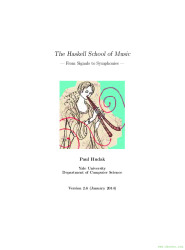The Haskell School of Music
Conversely, the book opens the door for programmers to interact with music by using a medium that is familiar to them. Readers will learn how to use the Euterpea library for Haskell to represent and create their own music with code, without the need for other music software.
The book explores common paradigms used in algorithmic music composition, such as stochastic generation, musical grammars, self-similarity, and real-time interactive systems. Other topics covered include the basics of signal-based systems in Haskell, sound synthesis, and virtual instrument design.
This is a textbook on functional programming in Haskell, with a strong focus on computer music concepts and applications. The book describes Euterpea, a computer music library developed in Haskell, that allows programming computer music applications both at the note level and the signal level.
The book also teaches functional programming in Haskell from scratch. It is suitable for use in the classroom to teach functional programming concepts, Haskell language details, computer music and audio processing concepts and applications - or all of the above.
Table of contents
- Computer Music, Euterpea, and Haskell
- Simple Music
- Polymorphic & Higher-Order Functions
- A Musical Interlude
- Syntactic Magic
- More Music
- Qualified Types and Type Classes
- Interpretation and Performance
- Self-Similar Music
- Proof by Induction
- An Algebra of Music
- L-Systems and Generative Grammars
- Random Numbers ... and Markov Chains
- From Performance to Midi
- Basic Input/Output
- Higher-Order Types and Monads
- Musical User Interface
- Sound and Signals
- Euterpea's Signal Functions
- Spectrum Analysis
- Additive and Subtractive Synthesis
- Amplitude and Frequency Modulation
- Physical Modelling
- Sound Effects
- The PreludeList Module
- Haskell's Standard Type Classes
- Built-in Types Are Not Special
- Pattern-Matching Details
| Pages : | 441 |
| Size : | 4.1 MB |
| File type : | |
| Downloads: | 62 |
| Created: | 2022-02-03 |
| License: | CC BY |
| Author(s): | Paul Hudak, Donya Quick |

Warning: Trying to access array offset on false in /home/tutovnfz/public_html/article.php on line 233
Others Haskell Tutorials
Haskell Tutorial for C Programmers
Others related eBooks about The Haskell School of Music
The DSC BookDownload free course The DSC Book, pdf file on 12 pages by Don Jones, Steve Murawski....
The Deno HandbookDeno is a runtime for JavaScript and TypeScript that is based on the V8 JavaScript engine ..., download free Deno tutorial in PDF (46 pages) created by ....
Think Complexity, 2nd EditionComplexity science uses computation to explore the physical and social sciences. In Think ..., download free Complexity tutorial in PDF (200 pages) created by ....
Essential BashThis book written to provide clear and concise explanation of topics for programmers both starting to learn the Bash programming as well as those diving in more complex topics. Most examples are linked to online playground that allows you to change the code and re-run it....
Building Secure and Reliable SystemsDownload free course Building Secure and Reliable Systems, pdf file on 557 pages by by Betsy Beyer, Piotr Lewandowski, Ana Oprea, Paul Blankinship, Heather Adkins, Adam Stubblefield....
Logical ReasoningThe goal of this book is to improve your logical-reasoning skills. Your logical-reasoning skills are a complex weave of abilities that help you get someone's point, generate reasons for your own point, evaluate the reasons given by others, decide what or what not to do, decide what information to ...
Machine Learning for Cyber Physical SystemsThis Open Access proceedings presents new approaches to Machine Learning for Cyber Physical Systems, experiences and visions. It contains some selected papers from the international Conference ML4CPS – Machine Learning for Cyber Physical Systems, which was held in Karlsruhe, October 23-24, 2018. ...
An Introduction to Combinatorics and Graph TheoryCombinatorics is a branch of mathematics concerning the study of finite or countable discrete structures. Aspects of combinatorics include counting the structures of a given kind and size (enumerative combinatorics), deciding when certain criteria can be met, and constructing and analyzing objects...
Ernst Denert Award for Software Engineering 2019Download free course Ernst Denert Award for Software Engineering 2019, pdf file on 142 pages by Michael Felderer, Wilhelm Hasselbring, Heiko Koziolek, Florian Matthes, Lutz Prechelt, Ralf Reussner, Bernhard Rumpe, Ina Schaefer....
Lightweight Systems for Realtime MonitoringDownload free course Lightweight Systems for Realtime Monitoring, pdf file on 27 pages by Sam Newman....